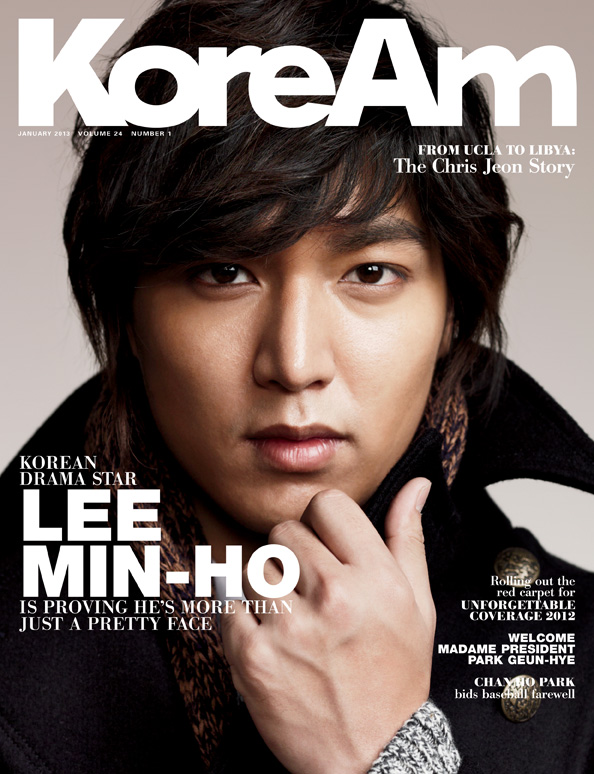Lee Min-ho, the popular Korean drama star who first rose to fame in the megahit Boys OverFlowers, could have played the same type of role over and over. But the 25-year-old actor instead has targeted a diversity of parts—and his international fans, dubbed “Minoz,” have loyally followed.
by ELIZABETH EUN
Lee Min-ho has finally become more famous than Goo Joon-pyo.
For years, the South Korean actor was referred to as “the curly-haired guy” or “the flower boy,” referencing his breakout role in 2009 as the wavy-maned Goo Joon-pyo from the hit Korean drama Boys Over Flowers.
The drama, aired in 19 countries, launched the young actor into megacelebrity status, and while, of course, fans and even a good majority of Korea knew his real name, it took a carefully planned career in the following years for Lee Min-ho to become Lee Min-ho.
Now, Lee, 25, is internationally recognized as an actor—a leading man, actually, rather than merely a “flower boy,” a term ironically popularized by his own drama and used to describe an overly “pretty” guy.
But with Goo Joon-pyo—the arrogant, privileged high school bully who transforms into a romantic softie on the popular drama—being both somewhat of an icon and a caricature, it is still difficult to separate the character from the actor. However, Lee doesn’t seem to mind.
“There’s nothing bad about it, is there?” said Lee, in emailed answers translated from Korean. “A lot of people fantasize about my personality after seeing me in dramas.”
The bad boy-turned-perfect man role was indeed so beloved that Goo Joon-pyo quickly became the center of the drama, compared to, earlier, when his female counterpart, Geum Jan-di, was the focus. In a bit of life imitating art, the actress, Ku Hye-sun, who was originally the much more established star, has since faded into the background, while Lee, a relative newcomer, emerged as the runaway star.
The massive success of his Boys Over Flowers role allowed Lee to become pickier about which parts he does take. “It’s definitely something I can be proud of. I’ve been getting far more offers since Boys OverFlowers, and it’s also what helped grow my fan base, which is important, because fans are the ones who keep me motivated,” said Lee.
Still, it wasn’t easy for Lee to separate himself from the lingering image of Goo Joon-pyo. In an August 2012 interview on an SBS entertainment news segment, Lee remarked on the rumors that he’s a bad boy, saying, “People think I’m a party animal, that I always drink and that I’m a womanizer,” before adding, “I actually can’t drink a lot, I rarely go outside and I like to stay at home.”
Considering his packed schedule, the statement might just be true, as he probably doesn’t have much free time to party. Since his 2009 hit, the 6-foot-tall, lanky actor, who incidentally is now sporting a cropped hair cut, has starred in a drama every year, and they’ve all been departures from his breakout role. In 2010, Lee played an aspiring architect who is mistaken as gay by his eventual (female) love interest in Personal Taste, while the following year, he played a cold assassin in City Hunter. Most recently, he took on another action role as the Goryeo-era warrior in the time travel drama Faith.
Not all of his dramas were hits, but each showed that the young actor was looking to diversify his parts, rather than just maintain his celebrity. That ambition was rewarded when he won SBS’s Top Excellence Award for Drama Special for City Hunter.
“It was uncommon for an actor in his 20s to star in an action drama,” Lee said of the role. “It was a new challenge for me. A drama like City Hunter is something I would love to try in film format.”
For an actor as popular as Lee is, it’s surprising that he hasn’t starred in any major motion pictures yet, though he’s had minor roles in two films.
“[Acting in films] is constantly in my thoughts,” he said. “I’ve been doing dramas throughout my career, but that was because I received offers to play roles I’ve wanted, and the timing happened to be right. If the right opportunity to act in a film presents itself, I’m willing to start any time.”
Even without a film vehicle, Lee’s international popularity only seems to be increasing. Fresh off Faith, the actor is currently on a mini-vacation, which, for a Korean celebrity, doesn’t actually mean he’s resting. After the drama wrapped, he traveled to Manila in the Philippines for four days to meet with fans, who swarmed his few public events by the thousands.
“I was very surprised and happy,” said Lee. “Many people tell me through SNS (social networking sites) that they wish I would come to their countries, and I want to do that.”
Korean television actors rarely travel worldwide for press events, but Lee has a reputation for going abroad to greet his fans, who incidentally even have a name: “Minoz.” During his Manila visit, that country’s media outlets declared, “Manila falls in love with Lee Min-ho” and “Korea’s superstar sweeps the nation.” In December, he headed to Yokohama, Japan, for an official fan meeting and also to promote Faith, which began airing there last month. He took the No. 1 spot for “Best Hallyu Star” in a Japanese magazine dedicated to Korean dramas in June of 2012. Last April, his appearance at an opening event in Xi’an for Semir, a major Chinese clothing brand, brought in so many fans, police officers had to shut down the event.
Of course, the star’s travels are strategic, too, and reflect the fact that he has been very successful in getting a number of endorsement deals outside of Korea. Lee has been tapped by the Filipino clothing brand Bench, and he serves as Toyota’s celebrity spokesman. The actor even stars in mini-YouTube dramas that strategically feature the Camry.
Though many Hollywood stars often try to escape attention, Lee is active on several social networking sites, including Facebook (he has over 6.4 million fans) and Twitter, with almost a million followers. He said he likes that this type of media gives him a more direct way to connect with his fans.
For Korean celebrities, maintaining a strong fan base is almost more important than actual talent. In an industry where it’s not uncommon to see fans stalking their favorite stars, it’s also the fans that keep the celebrities in business.
Lee often calls his fans “precious” and gushes about their support as “the source of my confidence and focus.” He said that he is constantly asking his staff to teach him new languages and phrases in order to better communicate with his foreign fans.
While it’s hard to take Lee seriously when he states things like, “I survive on the love of fans,” the sheer amount of times he remarks on his appreciation for his “Minoz” in public seems to indicate that he’s either incredibly aware of the power his fans hold, or he’s genuinely grateful.
Even when asked about how he deals with the more overzealous ones, he responds diplomatically. “So many of [my fans] recognize me, so it’s hard for me to live my personal life, and I do have some fans who are overly passionate,” said Lee. “But I’m of the belief that if I respect them sincerely, they’ll respect my personal life in return.”
But he also told the Manila press recently that he values his privacy and sneaks into movie theaters at certain times in the day, when he knows he’s less likely to attract a crowd. “I’ve mastered which theater to go to and at what time,” he said.
His caution is understandable, given that Korean celebrities have to deal with the wrath of netizens (online citizens) who seem to yield an alarming amount of influence in the country, which is the most wired nation in the world. Scandals can end careers, and online witch-hunts aren’t uncommon. Fans, even die-hard ones, have been known to turn against celebrities at the drop of a hat, proven most notably with 2PM’s Jay Park and Epik High’s Tablo, both music stars who suffered from a reversal of fame for scandals that would hardly bat an eye in America. (Tablo became the victim of an online witch-hunt that questioned his Stanford University credentials, of all things.)
Even something like dating must be handled carefully, though, when news broke of Lee’s relationship with City Hunter co-star Park Min Young, the reaction was fairly neutral. The relationship ended only a few months later, but it was still notable that the two high-profile celebrities were able to admit to their relationship.
So, perhaps Lee’s careful dealing with his fans is working. And no one can deny that his power over such a large number of fans is a factor when he’s up for roles. Faith, for example, was in the works for three years, with networks and actors (including Lee) passing on it, until Lee picked up the script again and decided to sign on as the lead. Almost immediately, SBS, the broadcaster behind City Hunter, gave it a prime time slot.
Lee’s appeal to Korean entertainment executives doesn’t just come from his domestic appeal; it draws also from his huge international fan base, which means, even if a drama starring Lee happens to be a flop in Korea, broadcasters can still distribute the drama overseas—for a hefty profit.
Notably, even Lee, who’s been labeled a “hallyu (Korean wave) star,” doesn’t quite understand the appeal Korean shows have overseas.
“I think there’s an exclusive emotional element in Korean dramas,” he said. “It’s hard to explain in words, and it’s actually a question I want to ask the fans.”
Knowing Lee’s reputation, it probably is something he will ask his fans at some point.
For now, though, when asked about his goals for 2013, his answer is overly general, perhaps reflecting the wide open future of a rising star his age.
“In 2013, I want to take on either movies or dramas, in a variety of genres,” said Lee, who as a youth dreamed of being a soccer player. “It’s my goal to meet a good project and show a different side of myself.”
___
All photos courtesy of Starhaus
This article was published in the January 2013 issue of KoreAm. Subscribe today! To purchase a single issue copy of the January issue, click the “Buy Now” button below. (U.S. customers only.)











